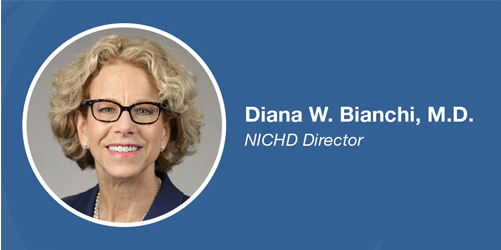 How did you become interested in science and research?
How did you become interested in science and research?
As a child, I was interested in nature and biology and was profoundly influenced by watching my cat give birth to her kittens under my bed. I also grew up in New York City and took public transportation every day to school. I would observe people with medical conditions, such as jaundice or congenital anomalies, and wondered what caused them and if there were treatments that could help.
Later, I had wonderful female role models. My high school AP biology teacher was very dynamic. I also worked in the Cytogenetics Laboratory at Roosevelt Hospital. There, I had exposure to two female pediatricians, wrote a senior thesis on my research, and my training led to further research opportunities in college and medical school.
What brought you to NICHD?
Before I came to NICHD, I spent 23 years as a professor of pediatrics and obstetrics and gynecology at Tufts University School of Medicine and as a practicing neonatologist and medical geneticist. Throughout my career, my interests have encompassed all these fields. When I joined Tufts Medical Center, I made the business case for why Tufts needed a multi-disciplinary institute focused on improving outcomes for both pregnant women and their infants. In 2010, Tufts established the Mother Infant Research Institute, or MIRI, and I served as its founding executive director.
That experience, combined with decades working in the clinic, bridging the fields of obstetrics/gynecology and pediatrics, and leading research teams, was very relevant for eventually leading an institute that focuses its research on child health (~54%), reproductive health (~30%), and intellectual and physical disabilities (~16%).
What really brought me to NICHD, however, was the opportunity to give back to a country that welcomed my immigrant family and to be able to have a greater impact for the populations we serve.
What types of training, experiences, or traits are essential for success in your position?
I think the most important trait is to be a good listener and to create an atmosphere in which one’s colleagues are inspired and motivated to give their best efforts. I think humility is also very important. No one person knows everything, so if we create an organization in which we celebrate intellectual curiosity, respect each other’s differences in opinion and/or backgrounds, and learn from each other, we will be achieve our goals.
What do you find most valuable about working at NICHD?
Is it all right to have two favorites? One favorite is the staff of NICHD, who are all focused on achieving our vision of “Healthy Pregnancies. Healthy Children. Healthy and Optimal Lives.”
Another favorite element about working at NIH is that we are known as the “House of Hope,” and our mission is very clear. We are not running a business. We are here to advance science with the goal of making people’s lives better. It’s the purest mission.
Can you explain your job to people who are not familiar with scientific positions outside of a laboratory or clinical setting?
As Director of NICHD, I oversee the institute's research on pediatric health and development, maternal health, reproductive health, intellectual and developmental disabilities, and rehabilitation medicine, among other areas. These efforts include managing a staff of approximately 1,400 people and an annual budget of approximately $1.6 billion.
Soon after I joined the institute, I co-led efforts to create the NICHD Strategic Plan, which outlines goals and aspirations to guide the institute’s research for the next 5 years. I also oversaw the crafting and vetting of the institute’s new vision and mission statements. The latter, generated alongside the strategic plan, underscores NICHD’s directive since its founding—to lead research and training to understand human development—and incorporates goals for all facets of NICHD to improve reproductive health, enhance the lives of children and adolescents, and optimize abilities for all.
What advice can you offer to people who are at an earlier stage of their career?
One of the most important objectives is to get preliminary data. It’s important to explore many options, including NIH career development, professional society or foundation support to begin to test hypotheses, acquire preliminary data, and begin to establish a written track record. This will distinguish you from others at an early career stage.
Another piece of advice that I give to my trainees is to avoid getting so fixated on a hypothesis that if the results do not give you what you expected, you are disappointed. You may blind yourself to the significance of your data. You need to follow where the data lead you.
Return to Get to Know NICHD.
 BACK TO TOP
BACK TO TOP